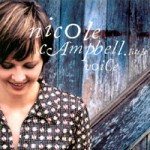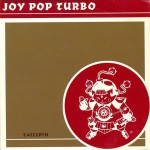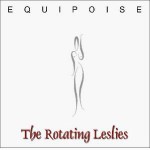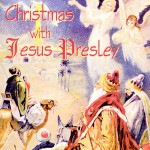 Nicole Campbell
Nicole Campbell
Little Voice
Wrought Iron Records
Time passes quickly. It’s been nearly seven years since Nicole Campbell first slipped into the local scene with the song “This Time” on the 1992 compilation Puddle Stomp. Even then, she impressed these ears with her rich voice and lyrical insight, which, after the fact, might be compared to that of Alannis Morissette. A few years later she returned in the band Ivan’s Wish. And again she dazzled local scribes with her impressive vocal abilities and capable songwriting talents. That stint culminated with the album Fir, released in the Fall of 1996. Within a year Ivan’s Wish failed to come true and disassembled.
For the past year or so, Nicole has worked as an ace backup singer in countless recorded projects and several live acts, while simultaneously creating this dark, moody opus to interpersonal estrangement. In fact, they don’t come much darker or moodier. With just a couple of more upbeat exceptions, each song is mid-tempo or slower and drenched in introspection; as Nicole dissects a dead relationship with the precision of a despondent coroner.
Which is not to say the album isn’t full of musical brilliance. For this project, Campbell has aligned herself with Melanie Kubik as producer and with some of the finest side musicians in town, including Terry Robb and the ever-ubiquitous Tim Ellis. They ably color each song with indelable character— as Nicole gives full rein to her remarkable contralto, wringing the last drop of pathos from each line of every song. Think of Katell Keineg singing the Joni Mitchell songbook.
“Take Me Down” leads off the set: a jangly, somber number with keen electric guitar filigrees and nervous maracas tracing the beat, while Nicole’s gorgeous voice enumerates the reasons why she should clear out of the aforementioned dead relationship. A sure-fire single and slightly uptempo, “Begone” benefits from a strong chorus and an even better bridge. A real keeper.
The title track is a slow-building waltz that culminates in a beautiful cascade of vocal rounds on the chorus, bedecked by moaning cello and crying violin and thundering piano chords. Nicole registers all of the emotive power of an earthquake in an opera house. Sensitive guitar accompaniment heightens the McLachlanesque “Traveling,” the lilting arrangement buffeted by ethereal choral background volcals and an evocative violin.
The only true rocker of the bunch is “Blind Faith,” which actually hearkens back to the Alannisish aspects of “This Time,” with sneering vocals and a slightly more cynical point of view. “Slow Suicide” is even drearier and less hopeful than the title might portend, though beautifully rendered. “My Heart Calls Out” probably sets the lyrical tone for the album with the line “Found myself talking backwards again/Just to make you understand.” A full-scaled Irish arrangement adorns “Queen Bee,” resplendent with violin, cello, mandolin, recorder and sumptuous vocal harmonies.
Nicole Campbell clearly demonstrates why her services as a vocalist are so clearly in demand around town, with a stellar performance throughout the eleven songs on her debut solo album. Her songwriting skills have also matured over the years. Although her lyrical focus seems singularly aimed here, her knack for melody and a memorable chorus obviate much of the deep disillusion and depression that are expressed in the words. It’s a dark and moody affair to be sure, but there is no denying Nicole Campbell’s tremendous talent— which is certain to be noticed on a much larger scale sometime very soon.
 Joy Pop Turbo
Joy Pop Turbo
Tailspin
Self-Produced
Singers, songwriters, guitarists Jody Garner and Heather Savoy have been partners in crime for several years now. For nearly two years they have combined forces with drummer Steve Hess and bassist Pete Ficht, honing their formidable pop chops. Here, on this two-song single, with the aid of ace producer Tony Lash, Jody and Heather move much closer to realizing their dreams of becoming household names. This is easily the best piece of work the Turbos have released yet.
Garner’s tune, “Tailspin,” rides upon an elemental, Breedersish low-string guitar figure, which really acquires definition after a second guitar (perhaps Lash) joins with Jody’s. Hess’ snare, the head so taut it sounds like a cowbell, thwacks methodically beneath, as if pulverizing the big chunks of Ficht’s sluicy bassline. Jody half-talks the verses, simple two-liners, that underscore her sense of sarcasm. “Forgiveness is a skill/ I have yet to acquire.” Jody and Heather join voices for a great chorus, reminiscent of the best of Kristen Hersh.
Heather’s entry, “School Rhymes” dances on her tense two-note tremolo guitar tightrope, accented by a churning wah-wah rhythm guitar, calling to mind some of Lush’s more acicular modalities. Her voice resembles that of Juliana Hatfield, somewhat girlish: which is more than appropriate for a vague lyric that sounds as if it’s inspecting Monica Lewinsky’s mindset while pondering her tryst with the Prez. A very interesting song, whoever it may be about.
Joy Pop Turbo show a definite positive progression with this single. Much of the outward gloss can be attributed to Lash, who is most definitely a world class producer/engineer. But beyond that, Savoy and Garner have sharpened their songwriting skills, paring their lyrics down to the point where they are practically haiku— but always with a wry sense of humor bubbling just below the surface. It’s a potent combination coming from these talented young women, the light of whose promise seems to grow more bright all the time.
 Pedro Luz
Pedro Luz
All Our Friends Took Your Side
Self-Produced
One has to admire Pedro Luz, ostensibly, for their fortitude or determination or cajones, or whatever. It was only eight short months ago that they received a severe lashing in these very pages. And yet, like Christmas and the flu, they are here once again. And because it is the Christmas season, Pedro Luz will be spared the Eastertime crucifixion they endured in April. Anyone truly curious can look to that earlier issue. Suffice it to say that I didn’t think that Pedro Luz had much going for them— as far as being a real musical entity out in the big world.
And I still don’t. But they have improved. Slightly. Sort of. They seem to know how to play their respective instruments, up to a limited point. And they are certainly harmless enough, performing the absolute minimum in pop rock: vague boy/girl relationship issues placed in the very barest of lyrical schematics, played out against (typically) four familiar chords, wanged mercilessly until track’s end. Yahoo.
But there are two slim exceptions. “Hit The Ground,” which the band “co-wrote” with someone named Kreiter, actually sports a real chorus— most certainly a first in Luzer lore. They should probably write more songs with this Kreiter person, if only to learn how to write choruses for themselves. “Pay For It Later,” bearing something of a structural similarity to the Beatles’ “Rain” and “Taxman” (while lacking any of the wit) manages to almost imply a chorus by not playing any chords at all. The rest of the material is even lamer and tamer.
Rather than to beat on Pedro Luz, which would be an amazingly easy thing to do, let us simply pause at yet another Christmas and give thanks for the blessings we have received throughout the past year. Rest assured that this writer considers himself very lucky indeed that there are not more bands like Pedro Luz.
 The Rotating Leslies
The Rotating Leslies
Equipoise
U-LBL-IT Records
The Rotating Leslies have been around for a few years now, perfecting their Middle Eastern-flavored sonic artistry, achieving an intrinsically idiosyncratic sound that is as hypnotically transfixing as it is well executed. The brothers Doody, bassist and lead vocalist Jeff and lead guitarist Brian are the instrumental driving forces here.
Jeff can snap off a Tony Levin-inspired slab of bass sludge with inventive gusto. And Brian can turn gnarled pentatonic scales on guitar into majestic symphonies. Patrick Costello provides solid drum support, aided and abetted by percussionist Matthew Siroka from Jesus Presley.
The album begins with the instrumental “Awake,” a lively raga driven by thundering drums, shimmering acoustic guitars, ethereal vocals by guest Karling Applegate and a cello-like sound generated by some instrument or another, perhaps a guitar or bass synthesizer.
“Understand” is a good example of one of Jeff’s more Levinian basslines, loping against Costello’s insistent beat and Brian’s flickering guitar tapestries. But the song also brings into clear relief some of the band’s only shortcomings. Lyrically, the Leslies seem directionless at times, choosing oblique obscurity over clarity in some cases. And as a lead singer, Jeff needs to learn to project vocally and emotively, in order to have his voice serve as anything more than a mere sonic object in the mix.
It’s not that his voice is bad. Jeff can carry a tune. He proves that on “Your Name Here/SFP,” where he croons in a pleasing baritone over an exotic arrangement— suggesting Bryan Ferry and Roxy Music. With “Different This Time,” Jeff moves, with moderate success, toward a more worldweary, Elliot Smithish approach to the vocals. And the great bass groove of “Painting Pictures Blue” is not entirely wasted on the vocals, though they seem mostly uninspired.
And that’s the biggest dilemma for this enterprising young band. The Rotating Leslies have all the instrumental prowess necessary to create consistently interesting musical suites. What they lack most is a vocal consistency of equal magnitude: availed of a certain lyrical fervor that might elevate the entire band to a higher emotional plateau.
This is certainly within Jeff Doody’s realm as lead singer to accomplish, if he is willing to invest in his vocal presentation what he infuses into his bass work. That would seem to be a challenge he can probably eventually surmount.
 Jesus Presley
Jesus Presley
Christmas With Jesus Presley
JPX Records
Now embarking upon their fourth year of creating musical mayhem in Portland clubs, Jesus Presley have consistently pushed stylistic envelopes, while retaining their sense of humor and showmanship. Despite numerous personnel changes over the years, the core of the band has remained amazingly cohesive, allowing frontman Reverend Tony Hughes to alter various aspects of the band, without tampering with the inherent sound— which has been described as “power lounge” and “R&B for the 21st Century.”
The undertaking of recording an album of traditional Christmas songs would seem to present an insurmountable challenge. Treading the fine line between reverence and cynicism would be beyond the scope of most performers to execute. It is for this reason that most best-selling Christmas albums are compilations of popular numbers by various artists.
What the Presleys have managed to accomplish is the creation of their own compilation, utilizing the talents of various individual members of the band in different combinations. There are four instrumental numbers scattered among the baker’s dozen presented. Two other Presley acolytes share the lead vocal duties with the Reverend. Not every song is a sendup, some are very straight forward. But the combination makes for a diverse and very enjoyable album of Christmas music that is sure to be a favorite for years to come.
It’s a party album, the evidence is obvious from the start, with sounds of bottle toppling and merriment abounding. The band breaks into a spirited rendition of “Jingle Bells,” which probably most resembles the Beatles’ “Ob La Di Ob La Da,” with accordion, piano and celeste accompaniment over the bass, drums, sleigh bells and gang backup vocals. A rousing R&B version of “Deck The Halls” follows, with bulging strings offset by Jamaican marimba tones supporting the Reverend’s aggressive lead vocals and the hot three-part backup vocals.
Saxman John Leubner steps forward into the solo spotlight on “Hark The Herald Angels Sing.” His buttery tone mixes elegantly with jazz tinged guitars into a comfortable hot toddy. Bass man Bret Malmquist pairs with vocalist Janice Deschene on the stirringly soulful “Silent Night.”
Pianist Rich Landar adds downtown style to “God Rest Ye Swinging Gentlemen,” as Leubner and trumpeter Dave Monnie frame Hughes’ lead vocal with elegant lines. SP Clarke weaves Philly soul synth strings into the mix, while drummers Matthew Siroka and Jason Mockley lay down a swinging beat. Landar and guitarist John Anderson contribute scintillating solos to this standout track. Sylvia’s Ghost lead vocalist Billy James steps to the mic for a fairly straight reading of “The First Noel,” recalling the pure tenor of Art Garfunkel. Anderson and Leubner submit sterlingly subdued guitar solos in the middle breaks.
Monnie and Leubner lead the charge on the Latin-flavored instrumental “Joy To The World.” Over an insistent bass/piano figure, the horns run through a straight take on the tune before branching into increasingly complex solos. The band resolves the song on a “Caravan” inspired fade. Well done.
“Oh Come All Ye Faithful” sounds like a sideshow rolling into another backwater town, selling snake oil and redemption; as the Reverend Tony prepares a laying on of hands. The band lends surprising life to the old warhorse “Angels We Have Heard On High,” using Van Morrison’s “Gloria,” as a well-fitting template for the song. A Classic. The sole original song of the set, “It’s Christmas Eve,” is laced with wistful melancholy, as Hughes longs for the safety of Christmases past.
What a delightful album Jesus Presley have assembled! From start to finish, this project drips with originality and pure musicianship. Many of the arrangements stand on their own, apart from their seasonal associations. As Christmas songs they shine with new life, creating a very merry atmosphere from start to finish. A remarkable achievement for this extraordinarily diverse and entertaining band.
